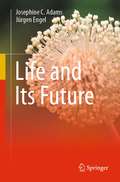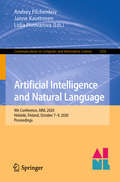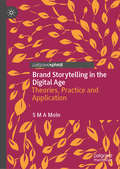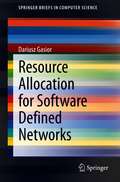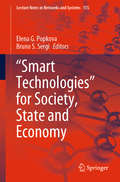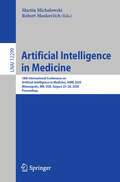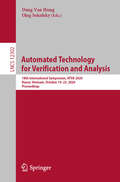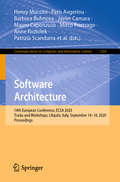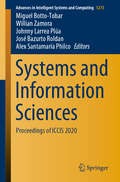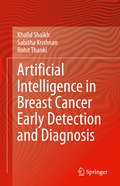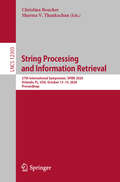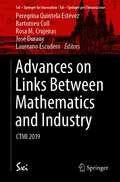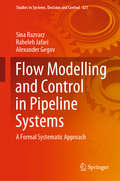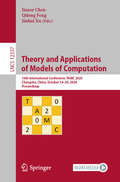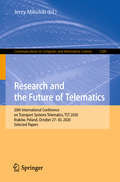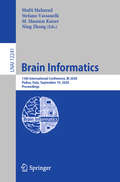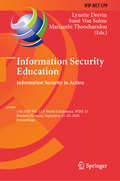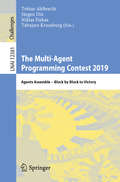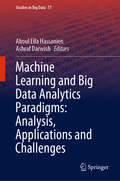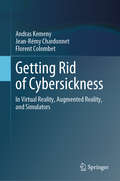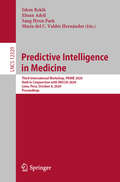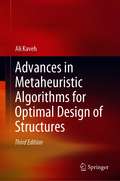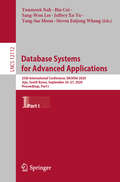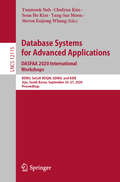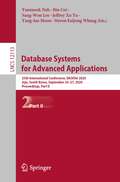- Table View
- List View
Life and Its Future
by Josephine C. Adams Jürgen EngelThis book is aimed at those who wish to understand more about the molecular basis of life and how life on earth may change in coming centuries. Readers of this book will gain knowledge of how life began on Earth, the natural processes that have led to the great diversity of biological organisms that exist today, recent research into the possibility of life on other planets, and how the future of life on earth faces unprecedented pressures from human-made activities. Readers will obtain a perspective on the potential risks of chemical or nuclear warfare, and the ever-increasing risks from human activities that are causing pollution and climate change with global heating. Readers will also learn about ongoing research efforts to generate “designer lifeforms” through synthetic biology and applications of artificial intelligence. The book makes an integrated, up-to-date, overview of topics often considered as separate fields. It should be valuable to students, teachers, and people who are concerned about the future of life.
Artificial Intelligence and Natural Language: 9th Conference, AINL 2020, Helsinki, Finland, October 7–9, 2020, Proceedings (Communications in Computer and Information Science #1292)
by Andrey Filchenkov Janne Kauttonen Lidia PivovarovaThis book constitutes the refereed proceedings of the 9th Conference on Artificial Intelligence and Natural Language, AINL 2020, held in Helsinki, Finland, in October 2020. The 11 revised full papers and 3 short papers were carefully reviewed and selected from 36 submissions. Additionally, the volume presents 1 shared task paper. The volume presents recent research in areas of of text mining, speech technologies, dialogue systems, information retrieval, machine learning, articial intelligence, and robotics.
Brand Storytelling in the Digital Age: Theories, Practice and Application
by S M MoinInextricably linked to human evolution, storytelling has always been a key element of the marketer’s toolkit. However, despite extensive practitioner interest, academic research on the topic currently falls short. This book highlights how storytelling has evolved from an ancient art to contemporary marketing science, placing it in the context of digitisation and social media. It reflects the dramatic shift in brand storytelling in which marketers are in the driving seat, leaving consumers to do the navigating.Based within the context of AI, the influence of VR, AR, big data, and new media, this book predicts a creative renaissance in brand storytelling; one that will be at the intersection of science, art and humanity. The author suggests that there will be a shift from ad to art through the use of cognition and emotion, data and fiction. It suggests that through storytelling, brands will be able to connect with their customers’ hearts and minds.Drawing upon interdisciplinary research on neuroscience, emotional attachment and narrative theory, the book critically analyses existing theories, practices and applications of storytelling, providing a platform for debate between academics, researchers and practitioners.
Resource Allocation for Software Defined Networks (SpringerBriefs in Computer Science)
by Dariusz GasiorThe book is devoted to the selected resource allocation problems in Software- Defined Networks. Moreover, it covers results concerning Software Defined Wide Area Networks (SD-WANs) which is one of the current networking hot topics. The variety of different cases is considered including virtualization and information-centric paradigm. For each case, the mathematical model together with the problem formulation is given and some solution algorithms are proposed. The algorithms are discussed and evaluated, mostly with simulations.
"Smart Technologies" for Society, State and Economy (Lecture Notes in Networks and Systems #155)
by Elena G. Popkova Bruno S. SergiThis proceedings book presents a comprehensive view of “smart” technologies and perspectives of their application in various areas of economic activity. The authors of the book combined the results of the cutting-edge research on the topic of “smart” technologies in the digital economy and Industry 4.0 and developed a unified scientific concept. The current experience has been considered, and the prospects for the application of “smart” technologies in society to promote social advance have been identified. “Smart” technologies in public administration and law, as well as the experience in development of e-government, have been examined. “Smart” technologies in business activity have been studied, and the transition from digital business to business 4.0 has been justified. The book contains the collection of the best works following the results of the 13th International Research-to-Practice Conference “Smart Technologies” for society, state and economy which was run by the Institute of Scientific Communications (ISC) and was held on July 2–3, 2020. The target audience of this book includes researchers investigating fundamental and applied problems of development of “smart” technologies, as well as concerned parties outside the academic community, in particular, representatives of the digital society, high-tech business entities and officials regulating the digital economy and Industry 4.0.
Artificial Intelligence in Medicine: 18th International Conference on Artificial Intelligence in Medicine, AIME 2020, Minneapolis, MN, USA, August 25–28, 2020, Proceedings (Lecture Notes in Computer Science #12299)
by Martin Michalowski Robert MoskovitchThe LNAI 12299 constitutes the papers of the 18th International Conference on Artificial Intelligence in Medicine, AIME 2020, which will be held online in August 2020. The 42 full papers presented together with 1short papers in this volume were carefully reviewed and selected from a total of 103 submissions. The AIME 2020 goals were to present and consolidate the international state of the art of AI in biomedical research from the perspectives of theory, methodology, systems, and applications.
Automated Technology for Verification and Analysis: 18th International Symposium, ATVA 2020, Hanoi, Vietnam, October 19–23, 2020, Proceedings (Lecture Notes in Computer Science #12302)
by Dang Van Hung Oleg SokolskyThis book constitutes the refereed proceedings of the 18th International Symposium on Automated Technology for Verification and Analysis, ATVA 2020, held in Hanoi, Vietnam, in October 2020. The 27 regular papers presented together with 5 tool papers and 2 invited papers were carefully reviewed and selected from 75 submissions. The symposium is dedicated to promoting research in theoretical and practical aspects of automated analysis, verification and synthesis by providing an international venue for the researchers to present new results. The papers focus on neural networks and machine learning; automata; logics; techniques for verification, analysis and testing; model checking and decision procedures; synthesis; and randomization and probabilistic systems.
Software Architecture: 14th European Conference, ECSA 2020 Tracks and Workshops, L'Aquila, Italy, September 14–18, 2020, Proceedings (Communications in Computer and Information Science #1269)
by Henry Muccini Paris Avgeriou Barbora Buhnova Javier Camara Mauro Caporuscio Mirco Franzago Anne Koziolek Patrizia Scandurra Catia Trubiani Danny Weyns Uwe ZdunThis book constitutes the refereed proceedings of the tracks and workshops which complemented the 14th European Conference on Software Architecture, ECSA 2020, held in L'Aquila, Italy*, in September 2020. The 30 full papers and 9 short papers presented in this volume were carefully reviewed and selected from 72 submissions. Papers presented were accepted into the following tracks and workshops: ECSA 2020 Doctoral Symposium track; ECSA 2020 Tool Demos track; ECSA 2020 Gender Diversity in Software Architecture &Software Engineering track; CASA - 3rd International Workshop on Context-aware, Autonomous and Smart Architecture; CSE/QUDOS - Joint Workshop on Continuous Software Engineering and Quality-Aware DevOps; DETECT - 3rd International Workshop on Modeling, Verication and Testing of Dependable Critical Systems; FAACS-MDE4SA - Joint Workshop on Formal Approaches for Advanced Computing Systems and Model-Driven Engineering for Software Architecture; IoT-ASAP - 4th International Workshop on Engineering IoT Systems: Architectures, Services, Applications, and Platforms; SASI4 - 2nd Workshop on Systems, Architectures, and Solutions for Industry 4.0; WASA - 6th International Workshop on Automotive System/Software Architecture.*The conference was held virtually due to the COVID-19 pandemic.
Systems and Information Sciences: Proceedings of ICCIS 2020 (Advances in Intelligent Systems and Computing #1273)
by Miguel Botto-Tobar Willian Zamora Johnny Larrea Plúa José Bazurto Roldan Alex Santamaría PhilcoThis book constitutes the proceedings of the 1st International Conference on Systems and Information Sciences (ICCIS), held in Manta, Ecuador, from July 27 to 29, 2020, and was jointly organized by Universidad Laica Eloy Alfaro de Manabí “ULEAM”, in collaboration with GDEON. ICCIS aims to bring together systems and information sciences researchers and developers from academia and industry around the world to discuss cutting-edge research. The book covers the following topics:AI, Expert Systems and Big Data AnalyticsCloud, IoT and Distributed ComputingCommunicationsDatabase System and ApplicationFinancial Technologies (FinTech), Economics and Business Engineeringm-Learning and e-LearningSecuritySoftware EngineeringWeb Information Systems and ApplicationsGeneral Track
Artificial Intelligence in Breast Cancer Early Detection and Diagnosis
by Khalid Shaikh Sabitha Krishnan Rohit ThankiThis book provides an introduction to next generation smart screening technology for medical image analysis that combines artificial intelligence (AI) techniques with digital screening to develop innovative methods for detecting breast cancer. The authors begin with a discussion of breast cancer, its characteristics and symptoms, and the importance of early screening.They then provide insight on the role of artificial intelligence in global healthcare, screening methods for breast cancer using mammogram, ultrasound, and thermogram images, and the potential benefits of using AI-based systems for clinical screening to more accurately detect, diagnose, and treat breast cancer.Discusses various existing screening methods for breast cancerPresents deep information on artificial intelligence-based screening methods Discusses cancer treatment based on geographical differences and cultural characteristics
String Processing and Information Retrieval: 27th International Symposium, SPIRE 2020, Orlando, FL, USA, October 13–15, 2020, Proceedings (Lecture Notes in Computer Science #12303)
by Christina Boucher Sharma V. ThankachanThis book constitutes the refereed proceedings of the 27th International Symposium on String Processing and Information Retrieval, SPIRE 2020, held in Orlando, FL, USA, in October 2020. The 17 full papers and 4 short papers presented in this volume were carefully reviewed and selected from 32 submissions. They cover topics such as: data structures; algorithms; information retrieval; compression; combinatorics on words; and computational biology.
Advances on Links Between Mathematics and Industry: CTMI 2019 (SxI - Springer for Innovation / SxI - Springer per l'Innovazione #15)
by Peregrina Quintela Estévez Bartomeu Coll Rosa M. Crujeiras José Durany Laureano EscuderoThis book results from the talks presented at the First Conference on Transfer between Mathematics & Industry (CTMI 2019). Its goal is to promote and disseminate the mathematical tools for Statistics & Big Data, MSO (Modeling, Simulation and Optimization) and their industrial applications. In this volume, the reader will find innovative advances in the automotive, energy, railway, logistics, and materials sectors. In addition, Advances CTMI 2019 promotes the opening of new research lines aiming to provide suitable solutions for the industrial and societal challenges. Fostering effective interaction between Academia and Industry is our main purpose with this book. CTMI conferences are one of the main forums where significant advances in industrial mathematics are presented, bringing together outstanding leaders from business, science and Academia to promote the use of mathematics for an innovative industry.
Flow Modelling and Control in Pipeline Systems: A Formal Systematic Approach (Studies in Systems, Decision and Control #321)
by Sina Razvarz Raheleh Jafari Alexander GegovThis book introduces novel methods for leak and blockage detection in pipelines. The leak happens as a result of ageing pipelines or extreme pressure forced by operational error or valve rapid variation. Many factors influence blockage formation in pipes like wax deposition that leads to the formation and eventual growth of solid layers and deposition of suspended solid particles in the fluids. In this book, initially, different categories of leak detection are overviewed. Afterwards, the observability and controllability of pipeline systems are analysed. Control variables can be usually presented by pressure and flow rates at the start and end points of the pipe. Different cases are considered based on the selection of control variables to model the system. Several theorems are presented to test the observability and controllability of the system. In this book, the leakage flow in the pipelines is studied numerically to find the relationship between leakage flow and pressure difference. Removing leakage completely is almost impossible; hence, the development of a formal systematic leakage control policy is the most reliable approach to reducing leakage rates.
Theory and Applications of Models of Computation: 16th International Conference, TAMC 2020, Changsha, China, October 18–20, 2020, Proceedings (Lecture Notes in Computer Science #12337)
by Jianer Chen Qilong Feng Jinhui XuThis book constitutes the refereed proceedings of the 16th Annual Conference on Theory and Applications of Models of Computation, TAMC 2020, held in Changsha, China, in October 2020. The 37 full papers were carefully reviewed and selected from 83 submissions. The main themes of the selected papers are computability, complexity, algorithms, information theory and their extensions to machine learning theory and foundations of artificial intelligence.
Research and the Future of Telematics: 20th International Conference on Transport Systems Telematics, TST 2020, Kraków, Poland, October 27-30, 2020, Selected Papers (Communications in Computer and Information Science #1289)
by Jerzy MikulskiThis book constitutes selected papers from the 20th International Conference on Transport Systems Telematics, TST 2020, held in Kraków, Poland, in October 2020. The 34 full papers presented in this volume were carefully reviewed and selected from 97 submissions. They were organized in topical sections named: telematics in road transport - general view; telematics in road transport - details in applications.- telematics in rail and marine transport; general about telematics.
Brain Informatics: 13th International Conference, BI 2020, Padua, Italy, September 19, 2020, Proceedings (Lecture Notes in Computer Science #12241)
by Mufti Mahmud Stefano Vassanelli M. Shamim Kaiser Ning ZhongThis book constitutes the refereed proceedings of the 13th International Conference on Brain Informatics, BI 2020, held in Padua, Italy, in September 2020. The conference was held virtually due to the COVID-19 pandemic. The 33 full papers were carefully reviewed and selected from 57 submissions. The papers are organized in the following topical sections: cognitive and computational foundations of brain science; investigations of human information processing systems; brain big data analytics, curation and management; informatics paradigms for brain and mental health research; and brain-machine intelligence and brain-inspired computing.
Information Security Education. Information Security in Action: 13th IFIP WG 11.8 World Conference, WISE 13, Maribor, Slovenia, September 21–23, 2020, Proceedings (IFIP Advances in Information and Communication Technology #579)
by Lynette Drevin Suné Von Solms Marianthi TheocharidouThis book constitutes the refereed proceedings of the 13th IFIP WG 11.8 World Conference on Information Security Education, WISE 13, held in Maribor, Slovenia, in September 2020. The conference was held virtually due to the COVID-19 pandemic. The 13 full papers presented were carefully reviewed and selected from 28 submissions. The papers are organized in the following topical sections: teaching methods and tools; cybersecurity knowledge within the organization; and teaching of detection and forensics.
The Multi-Agent Programming Contest 2019: Agents Assemble – Block by Block to Victory (Lecture Notes in Computer Science #12381)
by Tobias Ahlbrecht Jürgen Dix Niklas Fiekas Tabajara KrausburgThis book constitutes the 14th edition of the annual Multi-Agent Programming Contest, MAPC 2019, and presents its participants.The 2019 scenario and all its changes from previous competitions are described in the first contribution, together with a brief description and analysis of the five participating teams and a closer look at the matches. It is followed by a contribution from each team, introducing their methods and tools used to create their agent team and analyzing their performance and the contest.
Machine Learning and Big Data Analytics Paradigms: Analysis, Applications and Challenges (Studies in Big Data #77)
by Aboul Ella Hassanien Ashraf DarwishThis book is intended to present the state of the art in research on machine learning and big data analytics. The accepted chapters covered many themes including artificial intelligence and data mining applications, machine learning and applications, deep learning technology for big data analytics, and modeling, simulation, and security with big data. It is a valuable resource for researchers in the area of big data analytics and its applications.
Getting Rid of Cybersickness: In Virtual Reality, Augmented Reality, and Simulators
by Andras Kemeny Jean-Rémy Chardonnet Florent ColombetThis book provides a concise overview of VR systems and their cybersickness effects, giving a description of possible reasons and existing solutions to reduce or avoid them. Moreover, the book explores the impact that understanding how efficiently our brains are producing a coherent and rich representation of the perceived outside world would have on helping VR technics to be more efficient and friendly to use.Getting Rid of Cybersickness will help readers to understand the underlying technics and social stakes involved, from engineering design to autonomous vehicle motion sickness to video games, with the hope of providing an insight of VR sickness induced by the emerging immersive technologies. This book will therefore be of interest to academics, researchers and designers within the field of VR, as well as industrial users of VR and driving simulators.
Predictive Intelligence in Medicine: Third International Workshop, PRIME 2020, Held in Conjunction with MICCAI 2020, Lima, Peru, October 8, 2020, Proceedings (Lecture Notes in Computer Science #12329)
by Islem Rekik Ehsan Adeli Sang Hyun Park Maria del C. Valdés HernándezThis book constitutes the proceedings of the Second International Workshop on Predictive Intelligence in Medicine, PRIME 2020, held in conjunction with MICCAI 2020, in Lima, Peru, in October 2020. The workshop was held virtually due to the COVID-19 pandemic. The 17 full and 2 short papers presented in this volume were carefully reviewed and selected for inclusion in this book. The contributions describe new cutting-edge predictive models and methods that solve challenging problems in the medical field for a high-precision predictive medicine.
Advances in Metaheuristic Algorithms for Optimal Design of Structures
by Ali KavehThis book presents efficient metaheuristic algorithms for optimal design of structures. Many of these algorithms are developed by the author and his graduate students, consisting of Particle Swarm Optimization, Charged System Search, Magnetic Charged System Search, Field of Forces Optimization, Democratic Particle Swarm Optimization, Dolphin Echolocation Optimization, Colliding Bodies Optimization, Ray Optimization. These are presented together with algorithms which are developed by other authors and have been successfully applied to various optimization problems. These consist of Partical Swarm Optimization, Big Band Big Crunch algorithm, Cuckoo Search Optimization, Imperialist Competitive Algorithm and Chaos Embedded Metaheuristic Algorithm. Finally a multi-objective Optimization is presented to Solve large scale structural problems based on the Charged System Search algorithm, In the second edition seven new chapters are added consisting of Enhance colliding bodies optimization, Global sensitivity analysis, Tug of War Optimization, Water evaporation optimization, Vibrating System Optimization and Cyclical Parthenogenesis Optimization algorithm. In the third edition, five new chapters are included consisting of the recently developed algorithms. These are Shuffled Shepherd Optimization Algorithm, Set Theoretical Shuffled Shepherd Optimization Algorithm, Set Theoretical Teaching-Learning-Based Optimization Algorithm, Thermal Exchange Metaheuristic Optimization Algorithm, and Water Strider Optimization Algorithm and Its Enhancement. The concepts and algorithm presented in this book are not only applicable to optimization of skeletal structure, finite element models, but can equally be utilized for optimal design of other systems such as hydraulic and electrical networks.
Database Systems for Advanced Applications: 25th International Conference, DASFAA 2020, Jeju, South Korea, September 24–27, 2020, Proceedings, Part I (Lecture Notes in Computer Science #12112)
by Yunmook Nah Bin Cui Sang-Won Lee Jeffrey Xu Yu Yang-Sae Moon Steven Euijong WhangThe 4 volume set LNCS 12112-12114 constitutes the papers of the 25th International Conference on Database Systems for Advanced Applications which will be held online in September 2020. The 119 full papers presented together with 19 short papers plus 15 demo papers and 4 industrial papers in this volume were carefully reviewed and selected from a total of 487 submissions. The conference program presents the state-of-the-art R&D activities in database systems and their applications. It provides a forum for technical presentations and discussions among database researchers, developers and users from academia, business and industry.
Database Systems for Advanced Applications. DASFAA 2020 International Workshops: BDMS, SeCoP, BDQM, GDMA, and AIDE, Jeju, South Korea, September 24–27, 2020, Proceedings (Lecture Notes in Computer Science #12115)
by Yunmook Nah Chulyun Kim Seon Ho Kim Yang-Sae Moon Steven Euijong WhangThe LNCS 12115 constitutes the workshop papers which were held also online in conjunction with the 25th International Conference on Database Systems for Advanced Applications in September 2020.The complete conference includes 119 full papers presented together with 19 short papers plus 15 demo papers and 4 industrial papers in this volume were carefully reviewed and selected from a total of 487 submissions.DASFAA 2020 presents this year following five workshops: The 7th International Workshop on Big Data Management and Service (BDMS 2020) The 6th International Symposium on Semantic Computing and Personalization (SeCoP 2020) The 5th Big Data Quality Management (BDQM 2020) The 4th International Workshop on Graph Data Management and Analysis (GDMA 2020) The 1st International Workshop on Artificial Intelligence for Data Engineering (AIDE 2020)
Database Systems for Advanced Applications: 25th International Conference, DASFAA 2020, Jeju, South Korea, September 24–27, 2020, Proceedings, Part II (Lecture Notes in Computer Science #12113)
by Yunmook Nah Bin Cui Sang-Won Lee Jeffrey Xu Yu Yang-Sae Moon Steven Euijong WhangThe 4 volume set LNCS 12112-12114 constitutes the papers of the 25th International Conference on Database Systems for Advanced Applications which will be held online in September 2020. The 119 full papers presented together with 19 short papers plus 15 demo papers and 4 industrial papers in this volume were carefully reviewed and selected from a total of 487 submissions. The conference program presents the state-of-the-art R&D activities in database systems and their applications. It provides a forum for technical presentations and discussions among database researchers, developers and users from academia, business and industry.
